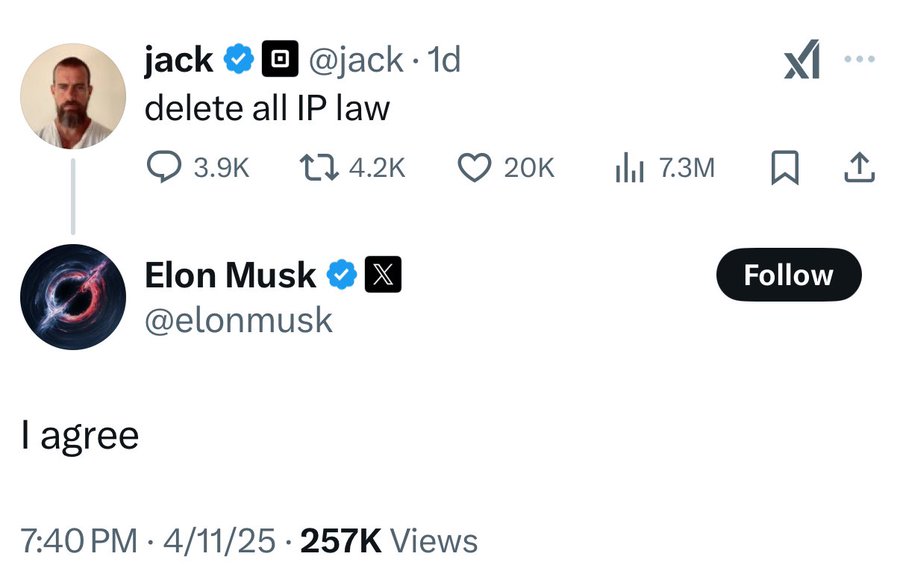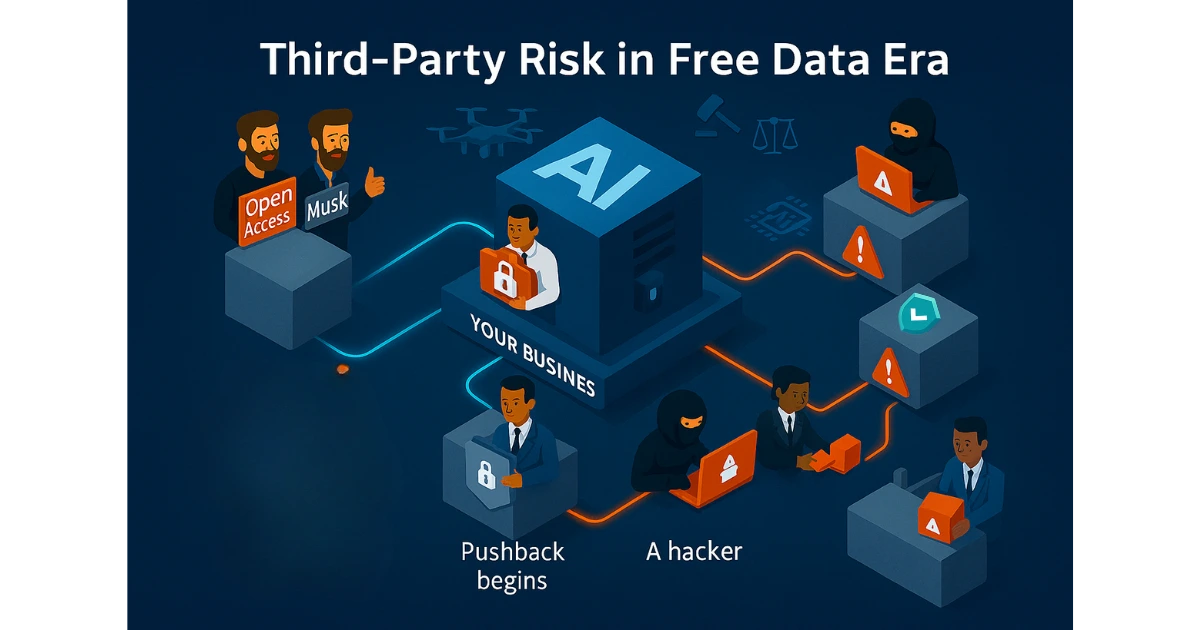







Imagine a world where your company’s secret sauce—your data—could be freely used by anyone. Sounds like a nightmare, right? Or maybe a golden opportunity? Tech giants like Jack Dorsey and Elon Musk are betting on the latter, pushing to ditch intellectual property (IP) laws to fuel AI innovation. But here’s the catch: the fallout could hit your business harder than you think, especially when third-party risks come into play. Let’s dive into this debate and figure out what it means for you.
First things first—what are IP laws? They’re the legal shields—patents, copyrights, trademarks—that protect your creations, from software code to customer data. Think of them as the bouncers at the club, keeping your hard work safe from freeloaders. According to Harvard Business Review, “IP laws ensure creators can thrive, fueling the cycle of progress.”
In the AI age, they’re a big deal. AI systems gobble up data to learn and improve, and much of that data is guarded by IP protections. But some argue these rules are choking innovation. Dorsey dropped a bombshell on X, saying, “Delete all IP law” (X post), and Musk chimed in, “IP laws are outdated and stifle innovation” (X). Bold moves—but are they onto something, or just stirring the pot?

Dorsey and Musk envision a data free-for-all: no IP laws, just open access to spark AI breakthroughs. It’s a tantalizing idea—fewer barriers, faster progress. But not everyone’s sold. Data scientist Abderahmane Boucetta fired back on LinkedIn: “Scrap IP laws, and you’re handing big tech a blank check. Small innovators? They’ll be crushed.” Ouch.
The numbers back him up. A WIPO report shows IP-intensive industries account for 30% of global jobs—billions of livelihoods tied to this system. So, is this a path to a tech utopia or a corporate power grab? Maybe history has some clues.
Cast your mind back to YouTube’s early days. Music videos were everywhere, uploaded for free—great for fans, brutal for artists. Sound familiar? The music industry fought back with lawsuits, but the real fix came with innovation: ads, subscriptions, and revenue-sharing turned chaos into cash (YouTube Help). As Medium puts it, “The industry adapted by embracing new tech, ensuring creators could thrive.”
Could AI follow suit? If data goes free, we might need a similar pivot—think data marketplaces where owners license their info instead of losing it. It’s not a pipe dream; it’s already starting.

Picture this: a platform where you list your datasets like songs on Spotify, earning a cut when AI companies use them. Platforms like Defined.ai and Innodata are making it real, balancing innovation with fairness. David Temkin of Trainspot told Digiday, “Without an open marketplace, it’s not clear what anything’s worth.” His co-founder, Ron Palmeri, added, “It’s a way for data owners to participate in the opportunity.”
This could be the middle ground—AI gets its fuel, and you keep control. But here’s the kicker: even with marketplaces, third-party risks could still trip you up.

If IP laws loosen, third-party risk management (TPRM) gets messy. Your vendors might tap into free-flowing data, but what if they misuse it? Imagine a supplier training an AI with your unprotected data, then selling it to a rival—or a cybercriminal snagging it. Fructose predicts half of businesses will wrestle with TPRM by 2025 as regulations shift.
Cybersecurity expert Alexis Hirschhorn of Abilene Advisors told us, “Freeing data might spark innovation, but it’s a gamble. Businesses need to brace for a world where legal guardrails fade.” As the World Intellectual Property Organization points out, “Without intellectual property protection, individuals and companies would not reap the full benefits of their inventions and would focus less on research and development.” In other words, IP laws remain a key tool to prevent innovation from becoming a privilege reserved only for the biggest players.
Tools from companies like Supplier Shield can help track vendor risks (Supplier Shield). However, relying solely on technology is insufficient; you must maintain a proactive approach.
Here’s the bottom line: scrapping IP laws could turbocharge AI, but it might leave your business vulnerable. Data marketplaces offer hope, but third-party risks loom large. So, as the rules twist and turn, ask yourself: how will you protect your edge—and your risks—in a world of third-party unknowns? The future’s coming fast—don’t get caught off guard.
Harvard Business Review How Intellectual Property Protections Affect Innovation
Jack Dorsey X Post Delete All IP Law
Elon Musk X Post Agreeing on IP Laws
Abderahmane Boucetta LinkedIn Post IP Laws and AI
WIPO Pressroom IP and Jobs Statistics
Gartner Press Release TPRM Struggles Prediction
Cybersecurity Ventures Third-Party Breach Costs Estimate
Forrester Report State of Third-Party Risk Management 2023
Defined.ai Leading AI Data Marketplace
Innodata AI Data Marketplace Platform
Digiday Article Trainspot AI Data Marketplace Launch
Medium Article Monetization of Music in the 21st Century
YouTube Help Monetization Policies for Artists
Bridge.audio Blog Monetization Strategies for Music Industry
Vocal Education Article How YouTube Changed Music Industry
Yellowbrick Blog Evolution of Music Distribution and Monetization
GeeksforGeeks Top AI Dataset Marketplaces Overview


